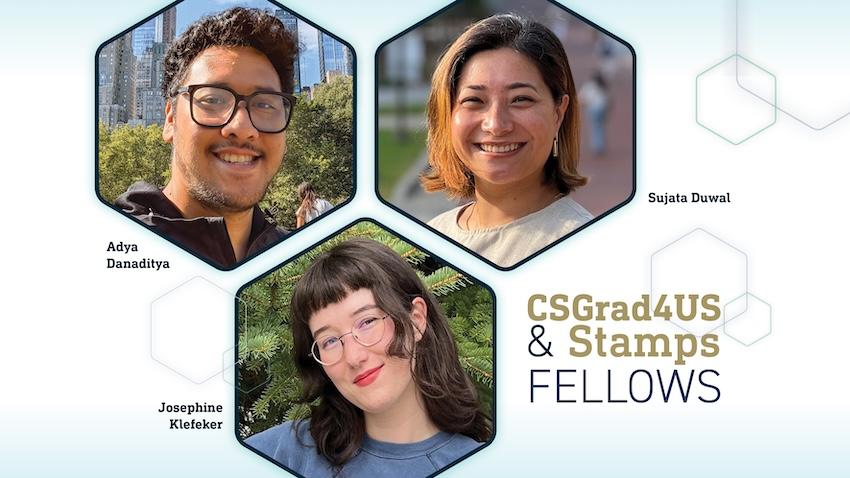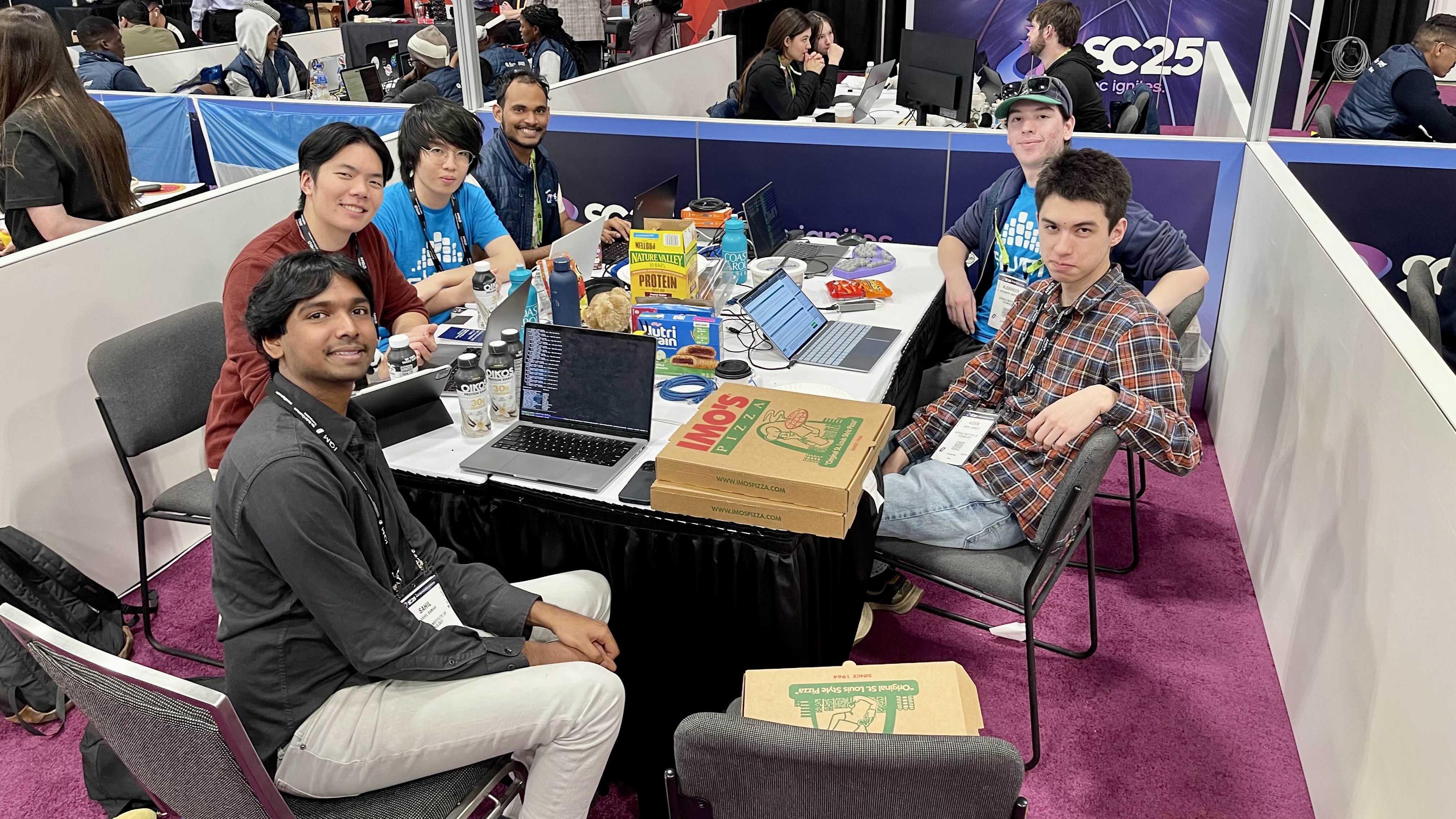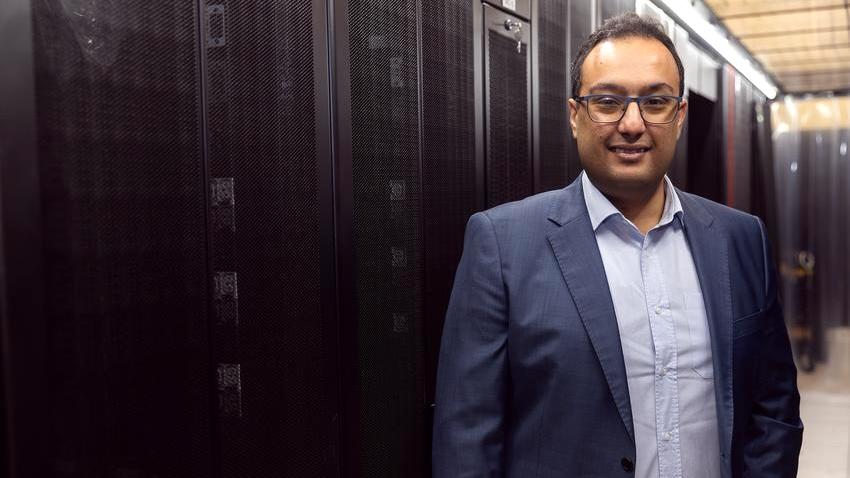
Prestigious Fellows Bring Industry Experience to School of IC
Three first-year Ph.D. students in the School of Interactive Computing (IC) are bridging academia and industry through prestigious fellowship programs.
Adya Danaditya, a Ph.D. student in human-centered computing (HCC), is a member of Georgia Tech’s 2025 Stamps Fellows Program. Stamps Fellows are considered exceptional scholars who are positioned to advance technology and improve the human condition. It is the highest merit-based doctoral fellowship offered by Georgia Tech.
Josephine Klefeker and Sujata Duwal also join the School of IC as HCC students thanks to the National Science Foundation (NSF) Computer and Information Science and Engineering Graduate (CSGrad4US) Fellowship. This fellowship gives bachelor’s degree holders working in industry the opportunity to pursue research-based doctoral degrees.
“These fellows are exemplary junior scholars who are paving new ways for exploring how computing can be studied, how it can be applied, and which communities should be included in these new applications and meanings of technology,” said School of IC Assistant Professor Cindy Lin.
Lin is advising Danaditya and co-advising Klefeker along with School of IC Professor and Chair Shaowen Bardzell. Duwal is advised by Associate Professor Alex Endert.
“Programs such as CSGrad4US and Stamps are designed to cultivate innovative computing research projects by researchers who can expand the interconnections of technology, society, and values,” Lin added. “They are refining and expanding the scope of what we consider to be interactive computing research.”
Danaditya relocated to Atlanta from his native Indonesia, where he worked as an artificial intelligence (AI) ethical consultant with the United Nations Education, Scientific, and Cultural Organization (UNESCO). He has advised the Indonesia government and several other governments in Southeast Asia on developing ethical AI policy.
Danaditya said he plans to conduct research on the specific needs of the Global South that can be met by AI policies.
“I help a lot of governments in Southeast Asia to draft policy response for AI, and they have frameworks of how to assess AI readiness,” Danaditya said. “Those frameworks are more attuned to the needs of the Global North, so I want to create frameworks based on the lived realities of the Global South.”
Klefeker spent three years as a front-end web developer after earning her bachelor’s in technology, arts, and media from the University of Colorado-Boulder. Before coming to Georgia Tech, she took a year off from work while running an online business that sells vintage clothing.
Klefeker said she’s held an interest in fashion since she was young and realized she could turn that interest into a doctoral thesis. As she sold clothing online, she learned more about the worsening problem of textile waste. Textile waste from used clothing accumulates in landfills, creating toxic chemicals and carrying a high carbon footprint.
“I’m interested in studying how technology mediates people’s experiences with fashion, specifically fast fashion, which is a very technologically driven social issue that leads to fashion overconsumption and textile waste,” Klefeker said.
“Most used clothing that avoids the landfill in the U.S. ends up being shipped abroad, and then other countries are forced to deal with massive amounts of textile waste. I’m looking at how technology can create alternative solutions — different ways to interact with and think about clothing.”
Duwal joins Endert’s Visual Analytics Lab. Originally from Nepal, Duwal comes to Georgia Tech with a background in business and technology. She earned her bachelor’s in business administration in computer information systems from Texas State University before working for three years as a data engineer and product manager at Dell Technologies.
While she hasn’t narrowed down a specific focus for her Ph.D., she said she is enthusiastic in building novel theories in visualization that adjust to new classes of generative technologies.
She aims to use visualization and visual analytics to address questions of guidance and to explore how visualization is preserved by people from different cultural and socio-economic backgrounds.
“I stepped into industry thinking I would come back to academia,” Duwal said. “I wanted to see the different sides of these domains and how each uses technology.”
She added that autonomy in her projects was also alluring to her.
“Working in industry, the project is usually provided to you rather than coming from you,” she said. “It’s the opposite with research, and I like that. I can pursue what I find value in.”


